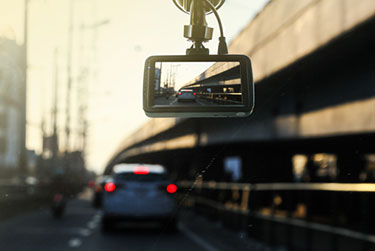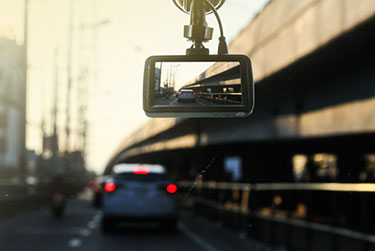
Written by Kayla Jane Barrie Updated on Mar 03, 2025 4 mins read

A picture is worth a thousand words. In the case of dash cams, they can save you thousands of dollars and prevent insurance price increases. Dash cams are used more and more on Canadian roads.
A dash cam can be a significant factor in accidents that have conflicting testimonies or evidence. They can help minimize fraudulent accidents, and determine which driver is at-fault. Thinking about being part of the 10% of Canadians with a dash cam installed? Here is what you need to know.A dashboard camera is a device used as a digital video recorder in your vehicle. A dash cam system is mounted on the dash of a vehicle. It is generally in the front and sometimes the rear and side. As the vehicle moves, it continuously records footage. They can help determine who caused the accident. Dash cams do not lower your Toronto car insurance, but they have many benefits. Since roads and highways are public property, it is legal to film. Always check your local laws to make sure it is legal to have a dash cam.
Insurance companies in Canada do not offer a specific discount if you install a dash cam. If you are in an accident and have one, it can help you save money during the claims process. They can also prevent your car insurance quotes from increasing. Here is how :
Depending on what province you live in and how the dash cam is installed, it can be covered under your policy. In Ontario, a permanently installed dash cam can be covered under your policy limit for electronic equipment that was not factory-installed. Check with your insurer to see if they will include a dash cam in your car.

There are no car insurance savings with a dash cam. However, it can protect you from being deemed responsible for an accident that was not your fault. If you are ever involved with a case of insurance fraud, such as someone faking an accident, a dash cam can prove you are not at fault. It can also help identify and catch fraudsters in action.
Here are the benefits of having a dash cam installed in your vehicle.
Dash cams are synced to your car ignition, which turns on and off with your car. Some cameras are equipped to run at all times. You can program dash cams to record while parked, known as parking mode, or if it senses motion. These settings can benefit your case if there is car theft, vandalism or a hit and run.
If both drivers debate who caused the accident, a dash cam can determine what happened at the scene of an accident.
Some dash cams come with automatic motion detection, wide-angle lenses, GPS systems, lane change and collision notifications.
There are a few cons to having a dash cam in your vehicle. Here is what you need to consider if you are planning on adding a dash cam.
Distracted driving attributes to 1 in 5 road fatalities. Changing dash cam settings while driving is dangerous and illegal. You can avoid this by installing the dash cam behind your rearview mirror or on top of your dash.
Technology in cars, such as GPS, smartphones, and cameras, is prone to theft. Consider dash cam options to record when the vehicle is off or avoid leaving the dash cam in your unattended vehicle.
Not all dash cams offer a 360-degree view around your vehicle. There may be situations where a dash cam does not get clear footage. There are options for front and rear recording that you can look for when buying a dash cam.
There is no insurance discount for having a dash cam installed. Having a dash cam installed will prove to be valuable if you are in an incident and there are no witnesses, or neither driver will claim responsibility.
In Canada, dash cams are legal, but depending on where you live, they could be illegal or have restrictions. Roads are considered public space; therefore, drivers can record footage. Another legal consideration is that dash cams should not obstruct your view, and a driver cannot block their windshield.
Having a dash cam does not give you savings on Ontario car insurance, but it can protect you from being wrongfully charged for an accident. For example, the footage can prove that you were not the cause of a collision, but without the video, you could have been deemed responsible.
Yes, dash cams are legal in Canada - 1 in 10 Canadians have a dash cam installed on their car. Dash cams need to be installed in a place that does not obstruct your view, and you should not use them while driving.
Dash cams can protect you from being deemed the cause of an accident or incident that was not your fault. They can help resolve a claim faster.
Some dash cams can be powered to record when you are not driving, known as parking mode. Parking mode will allow the dash cam to turn on when there is motion outside the vehicle. If your dash cam is plugged into the auxiliary power outlet, it will record when the car is turned on.
Dash cams can be mounted behind your rearview mirror or on top of the middle of your dash. You want to make sure the camera does not block your view. Make sure the dash cam is set up before you start driving to avoid distractions.
| Categories | Auto |
|---|---|
| Tags | Driving Tips |
Read our insurance blog to get helpful tips, information and news.
Find out if a seatbelt ticket will raise your car insurance rates and how insurers view seatbelt violations.
Ontario’s Project CHICKADEE dismantled a $25 million auto theft ring. Discover how this massive bust targets export enablers and what it means for rising Canadian insurance premiums.
Think refusing a breath test helps your case? In Ontario, it results in a minimum fine of $2,000 and a criminal record. Compare the penalties and protect your future.
Impaired driving in Ontario is a serious offence. Learn about impaired driving fines, penalties, statistics and other important information all drivers in Ontario need to be aware of before they get behind the wheel.